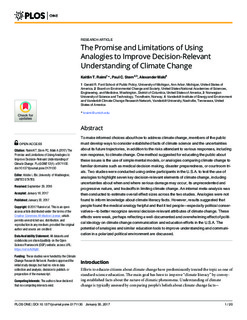| dc.contributor.author | Raimi, Kaitlin T. | |
| dc.contributor.author | Stern, Paul C. | |
| dc.contributor.author | Maki, Alexander | |
| dc.date.accessioned | 2018-06-06T11:19:21Z | |
| dc.date.available | 2018-06-06T11:19:21Z | |
| dc.date.created | 2017-06-14T14:53:04Z | |
| dc.date.issued | 2017 | |
| dc.identifier.citation | PLoS ONE. 2017, 12:e0171130 (1), 1-20. | nb_NO |
| dc.identifier.issn | 1932-6203 | |
| dc.identifier.uri | http://hdl.handle.net/11250/2500574 | |
| dc.description.abstract | To make informed choices about how to address climate change, members of the public must develop ways to consider established facts of climate science and the uncertainties about its future trajectories, in addition to the risks attendant to various responses, including non-response, to climate change. One method suggested for educating the public about these issues is the use of simple mental models, or analogies comparing climate change to familiar domains such as medical decision making, disaster preparedness, or courtroom trials. Two studies were conducted using online participants in the U.S.A. to test the use of analogies to highlight seven key decision-relevant elements of climate change, including uncertainties about when and where serious damage may occur, its unprecedented and progressive nature, and tradeoffs in limiting climate change. An internal meta-analysis was then conducted to estimate overall effect sizes across the two studies. Analogies were not found to inform knowledge about climate literacy facts. However, results suggested that people found the medical analogy helpful and that it led people—especially political conservatives—to better recognize several decision-relevant attributes of climate change. These effects were weak, perhaps reflecting a well-documented and overwhelming effect of political ideology on climate change communication and education efforts in the U.S.A. The potential of analogies and similar education tools to improve understanding and communication in a polarized political environment are discussed. | nb_NO |
| dc.language.iso | eng | nb_NO |
| dc.publisher | PLOS | nb_NO |
| dc.rights | Navngivelse 4.0 Internasjonal | * |
| dc.rights.uri | http://creativecommons.org/licenses/by/4.0/deed.no | * |
| dc.title | The promise and limitations of using analogies to improve decision-relevant understanding of climate change | nb_NO |
| dc.title.alternative | The promise and limitations of using analogies to improve decision-relevant understanding of climate change | nb_NO |
| dc.type | Journal article | nb_NO |
| dc.type | Peer reviewed | nb_NO |
| dc.description.version | publishedVersion | nb_NO |
| dc.source.pagenumber | 1-20 | nb_NO |
| dc.source.volume | 12:e0171130 | nb_NO |
| dc.source.journal | PLoS ONE | nb_NO |
| dc.source.issue | 1 | nb_NO |
| dc.identifier.doi | 10.1371/journal.pone.0171130 | |
| dc.identifier.cristin | 1476117 | |
| dc.description.localcode | © 2017 Raimi et al. This is an open access article distributed under the terms of the Creative Commons Attribution License, which permits unrestricted use, distribution, and reproduction in any medium, provided the original author and source are credited. | nb_NO |
| cristin.unitcode | 194,67,40,0 | |
| cristin.unitname | Institutt for psykologi | |
| cristin.ispublished | true | |
| cristin.fulltext | original | |
| cristin.qualitycode | 1 | |

